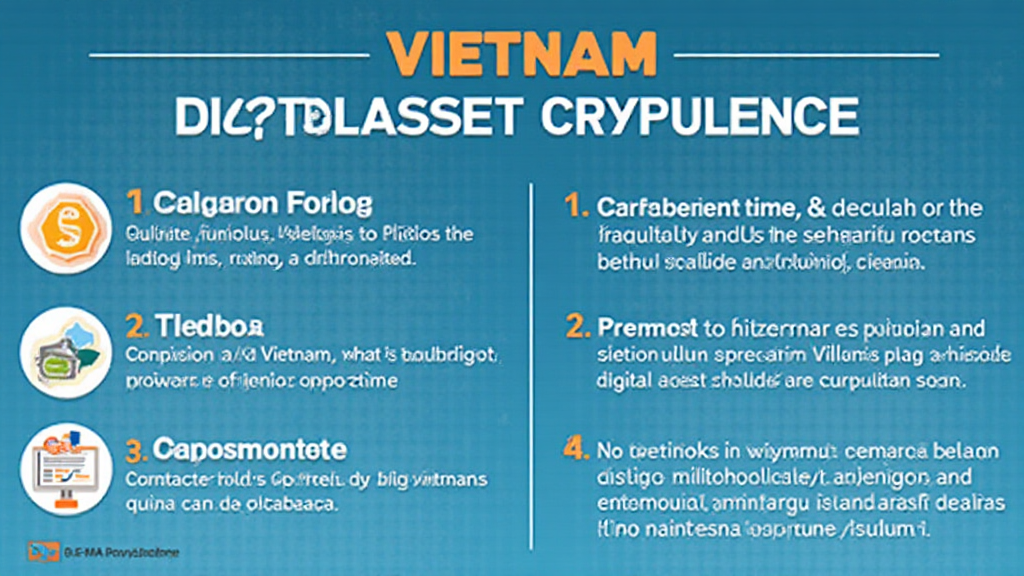Introduction
In recent years, Vietnam has emerged as a significant player in the cryptocurrency market. With a population of over 100 million, the country boasts a rapidly growing number of crypto users, reaching an estimated growth rate of 39% in 2023 alone. However, as the industry evolves, so does the need for regulatory compliance. In 2025, navigating Vietnam’s crypto regulatory landscape is more crucial than ever. With $4.1 billion lost to DeFi hacks globally in 2024, the importance of robust regulations cannot be overstated. This article aims to illuminate the critical aspects of Vietnam crypto regulatory compliance for businesses and investors alike.
Understanding Crypto Regulations in Vietnam
Vietnam’s regulatory approach to cryptocurrency has been somewhat cautious. The State Bank of Vietnam (SBV) has issued various directives aimed at preventing misuse of cryptocurrencies. The legal framework continues to evolve, framing the country’s stance toward digital assets.
- Key Regulations: In 2023, the Vietnamese government introduced several key regulations that impacted cryptocurrency operations:
- Prohibiting the use of cryptocurrencies as a legal tender.
- Establishing guidelines for virtual asset service providers (VASP).
- Implementing KYC (Know Your Customer) and AML (Anti-Money Laundering) requirements.
As we approach 2025, understanding these regulations is vital for businesses looking to operate within the Vietnamese crypto market.

Compliance Challenges for Crypto Businesses
Operating a cryptocurrency platform in Vietnam brings unique challenges. From licensing to customer onboarding, the compliance landscape is complex.
- Licensing Issues: Obtaining the necessary licenses to operate as a VASP can be a daunting task. The government requires full disclosure of business practices and compliance with local laws.
- Customer Onboarding: KYC processes must be thorough, ensuring that businesses can identify their clients and prevent illicit activities.
- Tax Obligations: Understanding the tax implications of cryptocurrency transactions is crucial for both businesses and users. The Vietnamese government and its tax authority—General Department of Taxation (GDT)—actively monitor digital asset transactions.
In 2025, companies must have refined compliance strategies to address these challenges effectively.
Implementing Best Practices for Regulatory Compliance in Vietnam
To ensure compliance with Vietnamese regulations, crypto businesses can adopt several best practices, acting as a shield against regulatory penalties and operational disruptions.
- Regular Compliance Audits: Conducting routine audits can help companies ensure they are adhering to existing regulations. Engaging professionals to perform these audits provides an additional layer of security.
- Employee Training: Ensuring that teams are well-equipped with knowledge about current regulations will streamline compliance efforts and reduce risks.
- Use of Compliance Software: Adopting comprehensive software solutions can aid in regulatory reporting and tracking compliance measures.
- Regular Communication with Authorities: Keeping an open line of communication with regulatory authorities such as the SBV and GDT can help anticipate changes and adapt promptly.
By integrating these strategies, businesses will be in a better position to navigate the regulatory landscape effectively in 2025.
Future of Cryptocurrency in Vietnam
The crypto landscape in Vietnam is set for considerable growth in the coming years. As per a recent report by Chainalysis, the Vietnamese cryptocurrency market is projected to expand by more than 100% by 2025, primarily driven by increasing interest from retail investors and institutional players.
- Growing User Base: With more than 6 million crypto users projected in 2025, Vietnam will likely become one of the leading markets in Southeast Asia.
- Innovative Projects: As the government embraces blockchain technology, new projects are continually emerging that comply with local laws and promote crypto adoption.
Consequently, staying updated with the evolving regulations will be pivotal for anyone looking to participate in this sector.
Conclusion
As Vietnam’s cryptocurrency market continues to evolve, so too does the critical nature of regulatory compliance. For the future, businesses need to adopt proactive approaches to ensure they remain compliant with regulations, thereby fostering a safe and secure crypto trading environment. By understanding Vietnam’s regulatory framework, implementing best practices, and maintaining open communication with regulatory bodies, crypto platforms can thrive in this vibrant market.
As 2025 approaches, preparedness will be key for all digital asset businesses operating in Vietnam. Make sure to stay informed and adaptable as the landscape continues to evolve.
For more information on regulatory compliance strategies, refer to hibt.com and explore our Vietnam crypto tax guide. Remember, this is not financial advice. Always consult your local regulators regarding compliance matters.
Author: Dr. Nguyen Minh Tuan
(Chain Analysis Expert, published over 15 papers in blockchain technology and led significant audits for known projects.)





